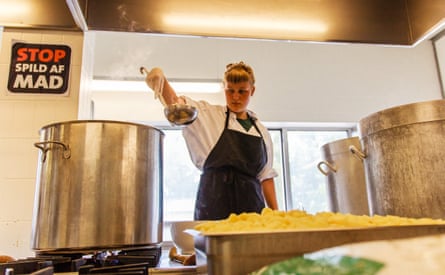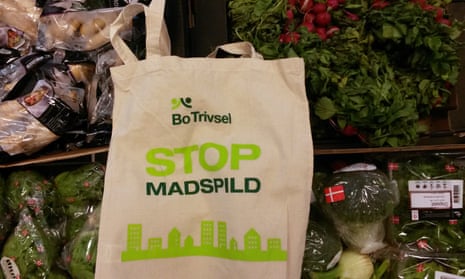A six-year-old sniffs asparagus suspiciously as his father grapples with a grapefruit and several women admire a selection of cabbages, in search of a bargain.
“Everyone pays 20 kroner (about £2) for a reusable bag to fill with whatever they like,” says Bettina Bach, 31, of Bo Welfare, a social housing project in the Danish city of Horsens that runs the food waste pop-up shop.
“We collect fruit and vegetables from local supermarkets to sell twice a week. It may be that the packaging’s damaged or it’s nearing its best before date, but it’s still good food – so we thought, why let it go to waste?”
Bach and a group of volunteers sell to 100-150 locals each week, and are at the grassroots end of Denmark’s battle against food waste, which is one of the most concerted in the world, and has cut waste by a quarter since 2010.
“Customers include those on benefits, refugees, low-income families – anyone really,” says Bach. “We don’t ask their background as many people need help these days with cutbacks. There’s also a big focus on the environment in Denmark – plus we have really high taxes. Danes love to save money and if they can help the planet at the same time, it’s win-win.”
Up the road is Horsens’ Visionary Kitchen where volunteers prepare free meals from shop-donated food that has reached its sell-by date. At volunteer-run food bank Kolding Madhjælp, pallets of supermarket produce that have been wrongly marked and might otherwise be destroyed are stocked alongside surplus food from a nearby hotel. Copenhagen’s first food waste supermarket, Wefood, has been such a success that a second is planned for Aarhus in 2017.
Startup Too Good To Go tackles waste from Danes’ favourite weekend institution: the all you can eat buffet. An app pairs customers with outlets come closing time, allowing them to fill a box with food at knock-down prices. And at Denmark’s 103 Q8 service stations staff recycle imperfect pastries into romkugler, or rum balls.Denmark has more initiatives against food waste in Europe than any other state – from awareness campaigns and partnerships to government subsidies for food waste projects. This is largely thanks to Stop Spild Af Mad - Stop Wasting Food – a lobby group set up by graphic designer Selina Juul.
Juul, 36, is originally from Moscow but moved to Denmark for her mother’s work. “Coming from a place where there were food shortages and people queued for bread, I was amazed at how much was wasted in Denmark, so I started a Facebook page.” She began offering tips – “little things like encouraging people to make a list before they go to the supermarket or take a picture of the inside of your fridge with your phone, if you have no time.”

“I started the page as an angry consumer, but Denmark’s a small country, so it’s easy to get press coverage and the message spreads. Three months later, the country’s biggest low-cost supermarket chain, Rema 1000, agreed to replace all its quantity discounts [like buy two get the third free] with single item discounts to minimise food waste and I was speaking at the EU parliament.” That was in 2008. Today, all supermarkets in Denmark have a strategy to reduce food waste.
“Stop Spild Af Mad works because we present solutions, not just problems,” says Juul. In 2015, a Gallup survey showed that every second Dane had a UFO, “unidentified frozen object”, in their freezer. “So we ran a campaign about having a clearout once a month to eat your UFOs,” says Juul. “We also promoted ‘Sunday leftover tapas’, and the idea that if you’re going away, you give your neighbour everything in your fridge – and they do the same for you.”
“It’s been a great exercise in reframing,” says the Danish food blogger Malou Rotvel Pagh, 43. “There used to be a stigma around leftovers but Selina changed that – her legwork resulted in a mental shift. People used to be embarrassed to ask for a doggy bag at a restaurant, as though they were taking home leftovers only good enough to feed the dog. Selina rebranded them as ‘goody bags’, filled with food you’ve already paid for – like your groceries – so why wouldn’t you bring them home?”

Comments (…)
Sign in or create your Guardian account to join the discussion